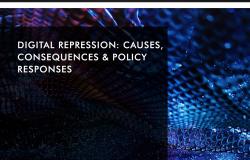New GP E-book - Digital Repression

In April 2022, a report by the investigative news outlet Inside Story revealed that the Greek financial journalist and editor Thanasis Koukakis had been targeted by "Predator" spyware. Manufactured by Cytrox, the spyware infects a target's cellphone by delivering a one-time "phishing" link, enabling the operator to monitor every aspect of the cellphone's use. Google and CitizenLab have asserted that the spyware has been primarily bought by government-backed actors. Such technology, and its ever-widening use, is emblematic of the contemporary prevalence of digital repression as a way to monitor, control and coerce forms of political and social opposition.
The contributors to this serialised e-book argue that ICTs are tools which can be used for both virtuous and wicked purposes. As such, its essays investigate different dimensions of digital repression in order to understand how and why governments employ repressive digital tactics. While autocrats more widely employ digital repression, it is paramount to understand that democracies also use repressive digital tactics for various reasons. By looking at a range of regime types, this volume increases policymakers' and researchers' understanding of the topic, and underlines the threat that digital repression poses to internet freedom and democracy around the globe.
Written by a group of the world's leading academic and policy experts, this forensic exposition of "digital repression" proceeds along four core themes. The first underscores how different digital techniques are used in digital oppression, how they differ in outcomes, and why some states employ digital repression. The second theme then probes who is responsible for the rise of digital repression and the role that states and private companies have in spreading its usage. In turn, the third theme highlights the consequences of digital repression and its dangers, before the final theme synthesises these perspectives to offer effective and practical policy responses for all key global stakeholders.
To download the free e-book for e-book readers, please click here or find the PDF below.
Digital Repression is an excellent introduction to a complex topic that concerns citizens, political and social activist, and political decision makers alike. The book merits a wide readership and deserves to be a standard read in advanced school and undergraduate social science and IT education.
Bettina Koch, Professor of Political Science, Virginia Polytechnic Institute & State University, Visiting Professor, TU Darmstadt.
Within little more than a decade, the internet in general, and social media in particular, has gone from being a vehicle for liberation and empowerment to becoming a cesspit of misinformation, hate-speech and political manipulation. This ebook expertly analyses the origins and nature of this negative journey, and what policy makers can do to restrain or reverse it.
Duncan Green, Professor in Practice at London School of Economics and Political Science and Strategic Advisor, Oxfam.
Contents
Introduction: Digital Repression: Causes, Consequences and Policy Responses - Chris Ogden and Olivia Hagen
1. Understanding the Incentives Driving Digital Repression - Steven Feldstein
2. Why do some states employ digital repression and not others? - Erica Frantz and Andrea Kendall–Taylor
3. Is digital transnational repression “spreading” among states? - Marcus Michaelsen
4. China’s Role in Global Digital Repression - Xiao Qiang
5. From the Unwitting to the Unscrupulous: Private Sector Complicity in Digital Repression - Adrian Shahbaz
6. When democracies employ repressive technology, what are the repercussions? - Jessica Brandt
7. Do digital technologies benefit governments or empower civil society actors? - Anita R. Gohdes
8. Political and Economic Tradeoffs: Understanding the Dictator’s “Digital Dilemma” - Jaclyn A. Kerr
9. Responding to Digital Repression: Opportunities for Governments - Allie Funk
10. The Role of Multinational Corporations in Combating Digital Repression - Richard Crespin, Caroline Logan and Ana Blanco
11. How can NGOs and people’s movements oppose the rise of digital repression? - Jennifer Earl
Conclusion: Accelerating Digital Repression and Its Existential Threat to Democracy - Chris Ogden and Olivia Hagen


